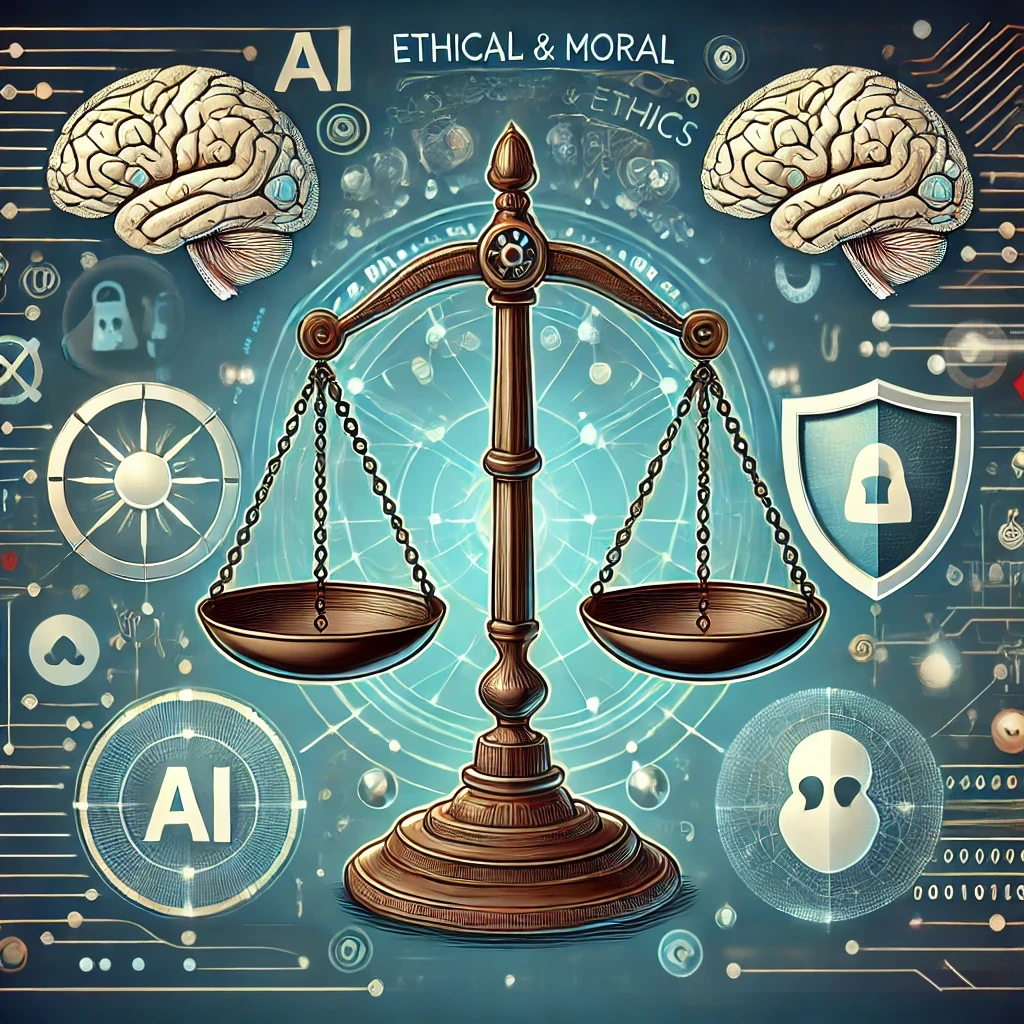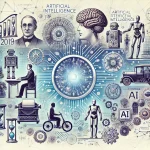As artificial intelligence (AI) becomes increasingly integrated into various aspects of society, questions about the ethical and moral implications of these technologies have taken center stage. From healthcare and finance to criminal justice and everyday life, AI systems influence decision-making processes that can profoundly affect people’s lives. Ensuring that AI algorithms are developed responsibly, with a focus on fairness, safety, and transparency, is critical to preventing harm and fostering trust in these technologies. This article explores the key ethical challenges in AI, the principles guiding the development of safe and fair algorithms, and potential solutions to address these concerns.
The Ethical Challenges of AI
AI systems hold immense promise for improving efficiency, productivity, and decision-making, but they also pose several ethical challenges. One of the primary concerns is the potential for bias in AI algorithms. AI models are often trained on historical data that may reflect the biases and inequalities present in society. If these biases are not properly addressed, AI systems can perpetuate and even exacerbate existing disparities.
For example, facial recognition technology has been criticized for being less accurate in identifying individuals with darker skin tones, leading to concerns about racial bias in law enforcement applications. Similarly, AI algorithms used in hiring and recruitment can inherit gender and racial biases from historical employment data, resulting in discriminatory outcomes.
Another key ethical issue is the lack of transparency in AI decision-making. Many AI systems, particularly those based on deep learning, operate as “black boxes,” meaning that their internal workings are difficult to interpret or understand. This lack of transparency raises questions about accountability and trust, especially when AI systems are used in high-stakes contexts such as healthcare, criminal justice, and finance.
Privacy is also a major concern in the context of AI. AI systems often require large amounts of data to function effectively, and this data may include sensitive personal information. Ensuring that AI systems handle data responsibly, protect user privacy, and comply with data protection regulations is essential to maintaining public trust.
Principles for Ethical AI Development
In response to these ethical challenges, researchers, policymakers, and organizations have proposed various frameworks and principles to guide the responsible development of AI systems. Some of the key principles include:
1. Fairness
Fairness is one of the most critical principles in AI ethics. It involves ensuring that AI systems treat all individuals and groups equitably and do not discriminate based on characteristics such as race, gender, age, or socioeconomic status. To achieve fairness, developers must carefully examine the training data used to build AI models, identify potential sources of bias, and implement techniques to mitigate these biases.
One approach to ensuring fairness is to use diverse and representative datasets that reflect the population for which the AI system is designed. Additionally, fairness audits can be conducted to evaluate the system’s performance across different demographic groups, and adjustments can be made to correct any disparities.
2. Transparency
Transparency in AI systems involves making the decision-making processes of algorithms understandable and interpretable. This principle is essential for building trust in AI technologies, particularly in sectors where decisions made by AI systems can have life-altering consequences, such as healthcare and criminal justice.
To achieve transparency, developers can use explainable AI (XAI) techniques that provide insights into how a model arrives at its decisions. For example, XAI methods can highlight the features or data points that were most influential in the AI’s decision-making process. By providing explanations, developers can ensure that AI systems are accountable and that users can understand and challenge the decisions made by these systems.
3. Accountability
Accountability in AI refers to the responsibility of developers, organizations, and policymakers to ensure that AI systems are used ethically and that any negative outcomes are addressed. This principle involves creating mechanisms for oversight and regulation, so that AI systems are subject to checks and balances.
One way to promote accountability is through the implementation of AI governance frameworks, which outline the roles and responsibilities of different stakeholders involved in the development and deployment of AI systems. Additionally, legal and regulatory frameworks can help establish clear guidelines for liability and responsibility when AI systems cause harm.
4. Privacy
Given the vast amounts of data required to train AI systems, privacy is a fundamental concern. Protecting individuals’ personal information and ensuring that data is collected, stored, and processed securely is critical to preventing misuse and maintaining trust in AI technologies.
To safeguard privacy, developers can use techniques such as data anonymization, encryption, and differential privacy, which adds noise to the data to protect individual privacy while preserving the utility of the dataset. Furthermore, adhering to data protection regulations, such as the General Data Protection Regulation (GDPR), is essential to ensuring that AI systems respect users’ privacy rights.
Building Safe and Fair AI Algorithms
Developing safe and fair AI algorithms requires a combination of technical expertise, ethical consideration, and regulatory oversight. Several approaches can be used to ensure that AI systems are designed with safety and fairness in mind.
1. Bias Mitigation Techniques
One of the most significant challenges in AI development is mitigating bias in algorithms. There are several techniques for reducing bias in AI models, including:
Pre-processing: Modifying the training data before it is used to build the AI model. This can involve removing or transforming biased features or ensuring that the dataset is balanced and representative.
In-processing: Modifying the learning algorithm itself to account for fairness. This can involve adding fairness constraints or penalties to the training process to ensure that the model treats all demographic groups equitably.
Post-processing: Adjusting the output of the AI model after it has been trained. This can involve re-calibrating the model’s predictions to correct for biased outcomes or adjusting decision thresholds for different groups.
2. Explainability and Interpretability
To address concerns about the “black box” nature of AI, researchers have developed techniques to make AI systems more explainable and interpretable. Explainable AI (XAI) methods provide users with insights into how AI models make decisions, enabling them to understand and challenge the system’s outputs.
For example, feature attribution methods can show which inputs were most influential in the model’s decision-making process. These techniques are particularly valuable in high-stakes applications, such as healthcare and finance, where the ability to explain and justify AI decisions is critical.
3. AI Auditing and Governance
Regular auditing of AI systems is essential to ensuring that they continue to operate ethically and fairly. AI audits involve evaluating the performance of algorithms against ethical benchmarks, such as fairness, transparency, and accountability. These audits can identify potential issues and provide recommendations for improving the system’s performance.
In addition to auditing, the establishment of AI governance frameworks can help ensure that AI systems are developed and deployed responsibly. These frameworks outline the roles and responsibilities of developers, regulators, and users, ensuring that there are clear guidelines for the ethical use of AI technologies.
Conclusion
As AI continues to play an increasingly central role in society, the ethical and moral challenges surrounding its development must be addressed to ensure that AI systems are safe, fair, and trustworthy. By adhering to principles such as fairness, transparency, accountability, and privacy, developers can create AI algorithms that minimize harm and maximize benefits. However, building ethical AI requires collaboration between technologists, policymakers, and society at large. By working together, we can ensure that AI technologies are developed responsibly and contribute positively to the world.



It’s good they’re talking about AI ethics, but how do they actually make AI “fair” and “trustworthy”?
Lol, you can’t. The AI just pulls all its info from the internet, and that place is loaded with fake news😂
Sounds good, but talk is cheap. 🤔 Who’s enforcing these principles? We need action!
fairness and transparency make ai good! 👍👍👍
AI ethics r lyk super important 🤔 but bias sux